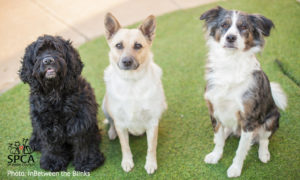 You’ve heard the saying “don’t judge a book by its cover.”
You’ve heard the saying “don’t judge a book by its cover.”
Now we present “don’t judge a dog by its breed.” The SPCA of Wake County is no longer listing dogs by their presumed breed with the hope that adopters will give each dog a chance to win you over for who they are, not who they look like they’ll be.
The SPCA removed breed listings to be better able to match families with a new, furry family member. When someone comes in to adopt a dog, we want them to see the dog standing in front of them, not the dog they think they will get based on the breeds listed on an information sheet.
It is important to keep in mind that in recent decades, many breeders have bred more for looks than behavior. Because of this, looking like a certain breed is no longer a reliable way to predict a dog’s behavior. Not all Labradors love water. Not all golden retrievers love children. Not all hounds will bay and howl. There are as many breed typecasts as there are breeds. Sometimes they’re accurate, but more often they’re not. We don’t want families to skip the dog that could be just the right fit or choose the dog that could be all wrong because a piece of paper identified the dog as a particular breed.
We’d much rather an adopter spend time with the dog they’re interested in. We’d rather discuss what you’re looking for and make recommendations based on how we’ve seen these dogs act while in our care.
Of course, we know there will be times when breed characteristics need to be discussed. Adopters will live in the real world with their new dogs and the rest of the world hasn’t removed breed listings. Landlords and insurance companies still have restrictions. Certain breeds still have commonly seen medical concerns.
Luckily, the SPCA has a long history of evaluating each animal based on temperament and specific training/medical needs. Staff members speak with all potential adopters about the dog they’ve chosen and any information we may know about them. If an adopter’s landlord restricts certain breeds and their chosen dog resembles one of those breeds, we will discuss it. Sometimes a dog’s breed may affect the type of care it requires. For example, English bulldogs often require medical vigilance for respiratory problems and skin infections. Some breeds are prone to a blood clotting disorder called von Willebrand’s disease. If someone were adopting a dog with similar concerns, these potential issues would be discussed.
Dropping the breed label won’t change how the dog looks, but will hopefully change the way people look at the dog. Our goal has always been, and still is, to set pets and adopters up for success for a long, happy life together. This step is just another tool to help us do that.
Interested in learning more? Come visit!
